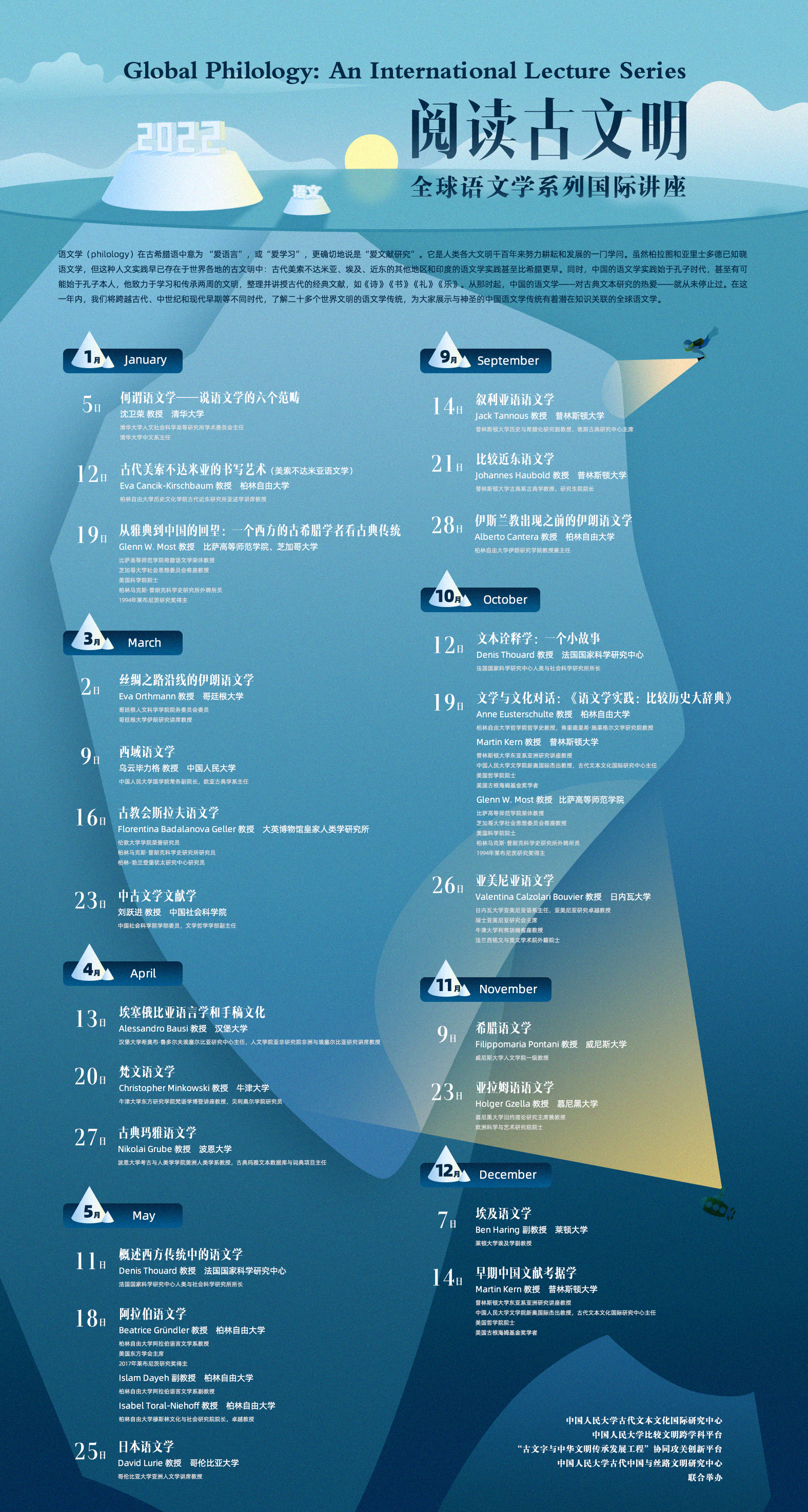[Upcoming] Global Philology: An International Lecture Series 2022
发布时间:2022-01-05Global Philology: An International Lecture Series
2022
International Center for the Study of Ancient Text Cultures 古代文本文化國際研究中心
Renmin University of China 中國人民大學

Philology, the ancient Greek word for the “love of language,” or love of learning, and more specifically the love of the study of literature, is a universal human endeavor. While known already to Plato and Aristotle, the humanistic practice it denotes can be found around the world: much earlier than in Greece, this practice existed already in ancient Mesopotamia, Egypt, other parts of the Near East, and India. Meanwhile, Chinese philology begins with in the time of Confucius, and perhaps even with Confucius himself who devoted himself to the learning of inherited cultural patterns (wen 文), including inherited texts such as the Shi 詩, the Shu 書, and the Yi 易. Since then, Chinese philology—the love of the study of literary texts—has never ceased. From the Warring States through the Han, from the Six Dynasties through the Tang and the Song all the way to the Qing and then modern China, scholars have been engaged in philology, a field that includes such disciplines as the study of documents (wenxianxue 文獻學), paleography (guwenzixue 古文字學), historical phonology (yinyunxue 音韻學), edition studies (banbenxue 版本學), catalog studies (muluxue 目錄學), epigraphy (jinshixue 金石學), and others.
Even more broadly conceived, philology also includes literary studies, literary criticism, textual criticism, lexicography, translation studies, as well as studies of the history of the book, manuscripts and the materiality of text, or paratexts. In short, philology is the principal, all-encompassing study of inherited texts both written and oral. It is only through the multi-disciplinary practices of philology that we can approach the textual past.
The yearlong academic endeavor “Global Philology: An International Lecture Series” is unique in its kind. It introduces more than twenty ancient, medieval, and early modern philological traditions and hence unfolds an entire world of potential intellectual connections with the hallowed Chinese philological tradition. Its speakers are without exception leading experts in their fields and hail from a broad range of academic institutions across Europe and North America.
Hosted and sponsored by Renmin University of China in Beijing, the lecture series is directed at every student and scholar of Chinese textual history to discover not merely similarities and differences with the Chinese philological tradition but, even more important, new and meaningful questions and perspectives that can be made fruitful and productive for the present and future practices of both global and Chinese philology. As we read in the third-century BCE text Xunzi 荀子, one of the great works of the Chinese philosophical tradition: 君子曰:學而不可以已 “The noble man says: ‘In learning, one must not desist’.”
January 12: The Art of Writing in Ancient Mesopotamia
Eva Cancik-Kirschbaum (Freie Universität Berlin)
January 19:From Athens to China and Back: A Western Student of Ancient Greece Looks at the Classical Tradition
Glenn W. Most (Scuola Normale Superiore di Pisa)
March 2: Iranian Philology Along the Silk Road
Eva Orthmann (Göttingen University)
March 16: Old Church Slavonic Philology
Florentina Gadalanova Geller (University College London)
April 13: Ethiopian Philology and Manuscript Culture
Alessandro Bausi (Hamburg University)
April 20: Sanskrit Philology
Chris Minkowski (University of Oxford)
April 27: Classic Maya Philology
Nikolai Grube (Bonn University)
May 11: Philology in the Western Tradition: A Brief Outline
Denis Thouard (Humboldt University Berlin)
May 18: Arabic Philology
Beatrice Gründler (Free University Berlin)
Islam Dayeh (Free University Berlin)
Isabel Toral-Niehoff (Free University Berlin)
May 25: Japanese Philology
David Lurie (Columbia University)
September 14: Syriac Philology
Jack Tannous (Princeton University)
September 21: Comparative Near Eastern Philology
Johannes Haubold (Princeton University)
September 28: Pre-Islamic Iranian Philology
Alberto Cantera (Free University Berlin)
October 12: Textual Hermeneutics: A Short Story
Denis Thouard (Humboldt University Berlin)
October 19: CONVERSATIONS ON LITERATURE AND CULTURE
Philological Practices: A Comparative Historical Lexicon
Anne Eusterschulte (Free University Berlin)
Martin Kern (Princeton University)
Glenn W. Most (Scuola Normale Superiore di Pisa)
October 26: Armenian Philology
Valentina Calzolari Bouvier (University of Geneva)
November 9: Greek Philology
Filippomaria Pontani (Ca’ Foscari University Venice)
November 23: Aramaic Philology
Holger Gzella (Ludwig Maximilians University Munich)
December 7: Egyptian Philology
Ben Haring (Leiden University)
December 14: Ancient Chinese Philology
Martin Kern (Princeton University)
December 21: Late Imperial Chinese Philology
Xu Jianwei (Renmin University of China)